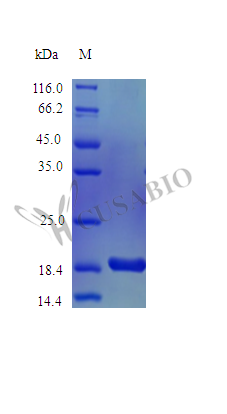Recombinant Macaca mulatta Interleukin-1 alpha (IL1A) is expressed in E. coli and represents the full length of the mature protein, spanning amino acids 113-271. This tag-free protein achieves high purity—exceeding 97% as confirmed by SDS-PAGE—and demonstrates biological activity. Endotoxin levels remain below 1.0 EU/µg, as measured by the LAL method. The protein shows robust activity, with an ED50 of less than 10 pg/ml in cell proliferation assays using murine D10S cells.
Interleukin-1 alpha (IL1A) appears to be a key pro-inflammatory cytokine involved in various cellular activities, including cell proliferation, differentiation, and apoptosis. It likely plays a critical role in immune responses and serves as an important mediator in inflammation and autoimmunity. IL1A has been extensively studied for its involvement in signaling pathways that may regulate the body's defense mechanisms, making it a significant focus in research on immune system function and inflammatory diseases.
Potential Applications
Note: The applications listed below are based on what we know about this protein's biological functions, published research, and experience from experts in the field. However, we haven't fully tested all of these applications ourselves yet. We'd recommend running some preliminary tests first to make sure they work for your specific research goals.
1. Cell Proliferation and Activation Assays in Primate Research Models
This recombinant rhesus macaque IL-1α is confirmed to be highly biologically active (ED₅₀ < 10 pg/ml in murine D10S cells) and suitable for stimulating immune cells in primate research models. The exceptional specific activity (>1.0×10⁸ IU/mg) and low endotoxin levels ensure reliable dose-response studies in primate-derived cell cultures. However, researchers should validate cross-reactivity with specific macaque cell types, as the activity was demonstrated in murine cells, and species-specific receptor variations may affect potency in some primate cellular contexts.
2. Comparative Cytokine Function Studies Across Species
The species-specific nature of this macaque IL-1α enables valid comparative studies with human IL-1α. The high biological activity and tag-free format support accurate comparisons of receptor binding affinities and signaling pathways. However, comparative experiments should be conducted in cell systems responsive to both cytokines, and researchers should account for potential differences in post-translational modifications between E. coli-expressed and native IL-1α when interpreting results.
3. Antibody Development and Validation for Primate Studies
This high-purity, biologically active protein serves as an excellent antigen for developing macaque-specific IL-1α antibodies. The confirmed activity ensures antibodies recognize functional epitopes. However, for applications requiring detection of native IL-1α in biological samples, antibodies should be validated against mammalian-expressed or naturally occurring IL-1α to ensure recognition of potentially modified forms.
4. Inflammatory Pathway Mechanistic Studies
The highly active IL-1α is suitable for dissecting inflammatory signaling pathways in primate cell systems. The defined specific activity allows precise dosing for kinetic studies of NF-κB activation, MAP kinase signaling, and inflammatory gene expression. Researchers can confidently use this protein for mechanistic studies, though they should note that the E. coli expression system produces a non-glycosylated form that may exhibit slightly different kinetics compared to native IL-1α in some contexts.
5. Preclinical Safety and Efficacy Studies for IL-1α Antagonists
This recombinant macaque IL-1α is ideal as a positive control and challenge agent in preclinical studies evaluating IL-1α inhibitors. The low endotoxin content and high biological activity ensure that observed effects are specifically attributable to IL-1α activity. However, for in vivo applications, researchers should confirm that the E. coli-expressed protein elicits similar responses to native IL-1α in primate models.
Final Recommendation & Action Plan
This E. coli-expressed rhesus macaque IL-1α is an exceptionally high-quality research tool with demonstrated potent biological activity, making it suitable for all proposed applications. For immediate use, employ it in cell proliferation assays and mechanistic studies, leveraging its high specific activity for precise dose-response experiments. When developing antibodies, this protein is ideal for immunization and assay development. For comparative studies with human IL-1α, conduct parallel experiments in appropriate cell systems to account for potential species-specific differences. While the E. coli expression system produces a non-glycosylated form, the confirmed high biological activity indicates proper folding and functionality. For in vivo applications or studies requiring native post-translational modifications, consider validating key findings with mammalian-expressed IL-1α when possible. Always include proper controls and dose-response validation to ensure data reliability across all applications.






